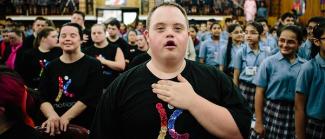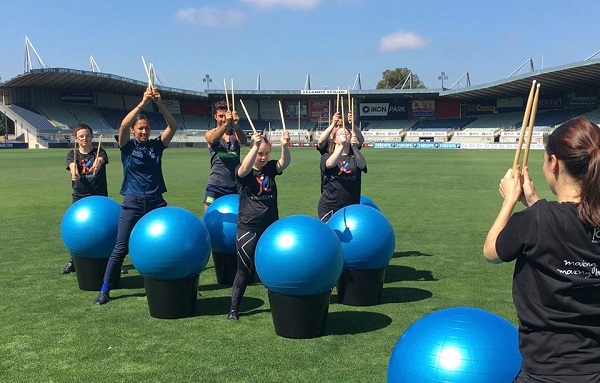
The heartwarming documentary Raising the Bar directed by Onir and presented by e.motion21 is about six young individuals from Australia with Down syndrome attending the World Down Syndrome Congress in Chennai. An interview with Karina Posanzini, CEO of e.motion21.
1. The documentary movie Raising the Bar has won awards and is doing the film festival circuit. Tell us about the movie and how did the Indian-Australian collaboration come about?
Raising The Bar highlights the universal experience of parental love and acceptance and how breaking preconceived boundaries allows people to conquer personal challenges. The powerful stories from Australian and Indian families highlight how refusing to accept traditional constraints placed by society allows the potential of every individual with Down syndrome to shine through.
The collaboration was inspired by India being selected to host the tri-ennial World Down Syndrome Congress in Chennai 2015. The vision of India with all its colourful chaos and sensory overload as a destination for a group of Australians with Down syndrome to travel to was daunting and exciting and we just had to proceed with this adventure and capture it on film!
Mitu and Cate, the co-producers of RTB, are great friends and mothers who both have a child with Down syndrome. It was a natural collaboration for the two to join forces and create this special and authentic film crossing two continents and cultures.
The fact that approximately 28,000 babies with Down syndrome are born every year in India, and that most of these babies do not experience basic human rights, significantly influenced our desire to make this film to share far and wide with our friends in India and throughout the world.
Through this film we wanted to convey the individuality and uniqueness of people with Down syndrome and their immense potential if given opportunities and a supportive learning environment.
2. What were the ideas explored in the films? Were there any surprises that came up during the shooting of the film? Any feedback from the community?
- Universality of parents love for their child across cultures, countries and continents.
- Influence of society on all of us.
- Preconceived ideas and how this impacts our expectations (of self and others).
- How high expectations is essential and becomes a breeding ground for success.
- Stigma and its effect.
- Determination to shift the status quo.
During filming in India we were surprised by the love, care and respect shown to our group of Australians with Down syndrome touring - from hotels to temples, sightseeing locations and shopping markets. People were looking at our group – not because they were judging those with disabilities, but because they were simply curious about the large Australians.
The enthusiasm and applause at Raaghiri by the general community dancing, and the support of the Indian government to enable us to perform at the event in Connaught place was extraordinary.
3. The theme for the year is "Enabling people with Down syndrome to speak up, be heard and influence government policy and action, to be fully included in the community" How does the movie "Raising the Bar" relate to the theme?
Raising The Bar is about raising expectations of oneself and others in order to fulfill life goals, dreams and aspirations; to be educated, live independently, work for a decent salary, fall in love, get married, travel, be a contributing member of society and to be respected.
4. Tell us about e.motion21
e.motion21 is a community based not-for-profit provider of evidence-based dance and fitness learning programs for children and young adults with Down syndrome aged 4 to 40 years.
e.motion21 vision is to enhance lives and change perceptions of Down syndrome within society. It does this through moving bodies and moving boundaries.
Moving bodies: providing evidence-based dance and fitness programs for children and young adults with Down syndrome in a supportive and social environment tailored to meet their specific learning needs.
Moving boundaries: providing channels to engage positively with individuals, families and communities to build relationships, uncover new potential, promote awareness and raise expectations of the abilities of people with Down syndrome.
5. Why does e.motion21 focus on dance and movement therapy for children with Down syndrome?
e.motion21 is a not-for-profit organisation founded in April 2009 by Cate Sayers, after she was unable to find an appropriate dance class to meet the learning needs of her daughter who has Down syndrome.
6. Why did you create Beat Fit™? What is the philosophy behind it? How does it go beyond dance?
RMIT University (2013) research outcomes demonstrated that e.motion21 dance classes are excellent for increasing social engagement for young people with Down syndrome and led to a 20% improvement in personal wellbeing for both adolescents and adults. The research also suggested that for our dancers to increase their fitness levels, a higher level of intensive activity was required. It was this research outcome that led us to develop our latest program specifically designed to improve fitness – Beat Fit™!!

This program is designed to follow the F.I.T.T guidelines:
- F = Frequency (3 sessions/week)
- I = Intensity (moderate)
- T = Time (at least 15 minutes/session of moderate activity)
- T = Type (aerobic)
If a participant follows the F.I.T.T guidelines then they should expect to see a notable increase in fitness levels. Beat Fit™ allows this to occur in a fun and supportive environment.
Beat Fit™ is a fast-paced group fitness program that combines traditional aerobic moves, the rhythm of drums, energetic music, and moderate-vigorous physical activity such as squats and lunges. This class has been specifically developed to meet the learning strengths of young people with Down syndrome. The sessions are fun and are currently open to participants of 12 years and up.
7. What are the benefits of Beat Fit™ - to children and to adults?
RMIT University (2014) research outcomes: Across the course of the research project, a statistically significant and important improvement in cardiovascular fitness was observed. This was indicated by an average increase of 23% across the two terms in meters run in the Multi-Stage Fitness Test, commonly referred to as the Beep Test.
When compared to those who completed less than two sessions a week, those who completed two or more Beat Fit sessions a week significantly improved their fitness. This indicates that being able to do 2 or more Beat Fit™ sessions a week is very important to see the desired improvements.
Parent Feedback
Parents and caregivers found extra fitness benefits in their children following their participation in Beat Fit™, including increased stamina, greater willingness to be active and less tiredness.
Parents and caregivers support Beat Fit™, reporting their children enjoyed the sessions, improved their fitness, and supported good social opportunities and new friendships.
Attenuation of Weight Gain
On average, over the course of the research project, no increases in weight gain were observed. This suggests the Beat Fit™ has the potential to attenuate weight gain.
Community and Social Engagement
Engagement in Beat Fit™ provides people with Down syndrome heightened levels of community engagement with their peers.
These health and well-being benefits in turn increase the level of confidence of participants and the opportunity to gain wilful employment.
8. Any final message on World DS day?
Let’s continue to move boundaries and create an inclusive world for people with Down's Syndrome - a world which enables full participation in society.






